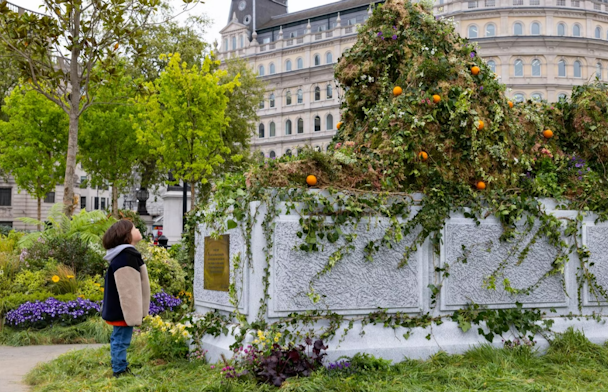Was Innocent’s Trafalgar Square takeover an environmental own goal?
Despite some efforts to offset emissions from its recent one-day Trafalgar Square takeover, people took to social media to criticize Innocent and claim the event another greenwashing stunt. Here, Don’t Panic’s founder Joe Wade offers his take on where it went wrong and what other brands can learn from it.

Innocent's Rewild campaign draws criticism
Last week, Innocent took over London’s Trafalgar Square to launch its new sustainability campaign, ’The Big Rewild’. It installed 6,000 plants, flowers and trees, erecting out-of-home posters that soak up CO2 and reroofed bus shelters with grass and plants.
Filling Trafalgar Square with plants for the day is like putting a wind turbine on the roof of your house and plugging it into the mains. It’s showy and actually worse for the environment than doing nothing at all.
An Instagram post from Innocent on the day of the launch stated: “We’ve rewilded Trafalgar Square as part of our ’Big Rewild’ campaign – bringing more than 6,000 plants, flowers and trees to the city in the process.”
The transportation of over 6,000 plants for just one day is totally unsustainable and almost certainly generates more emissions than not doing the stunt at all.
While Innocent has a lot to say about offsetting on its website, there’s no sign of the transportation emissions being offset for this particular project. People were left angered by the one-day installation – one person tweeted in a reply to innocent: “What a huge carbon cost for one day’s greenwashing! Trucking it all in and out again. Why don’t you sort your monumental use of plastic?”
It’s very well wanting to project an image of sustainability, but if promoting this means harming the cause you’re trying to stand for, it has hugely damaging effects not only for the planet but for the brand too.
On the positive side, it seems that the days of tokenistic stunts are numbered as younger generations wise-up to greenwashing tactics. One climate campaigner took to TikTok to expose Innocent’s shortfalling, stating: “I thought, or hoped, that it would be a campaign for environmental justice but quickly discovered that it was just an ad for Innocent.”
Seizing the moment, the campaigner took the opportunity to hand out leaflets featuring a campaign to make access to nature a human right – single-handedly out-marketing one of the largest global corporations.
Just a few months prior, Innocent had an ad banned by the Advertising Standards Authority for “misleading” environmental claims.
The ASA ruling read: “The ad firstly presented a depiction of a damaged planet and brown food. It then switched to imagery of the planet being ‘fixed up’ while Innocent drinks are being consumed alongside images of Innocent products.” And: “We considered that this implied there was a direct association between choosing Innocent drinks and taking positive action to help the environment.”
You might be thinking, is there ever a ‘good’ way to pull off an environmental campaign? The answer is yes! There are ways to avoid greenwashing and here are our top three tips:
-
Go for a long-term approach that promotes real positive change, rather than a flash in the pan activity with no longer term benefit.
-
Know your place and don’t overclaim (and get your ad banned by ASA) and be transparent about your credentials.
-
Partner with a nonprofit with the relevant experience if purpose isn’t inherent to your product or service. This will provide credibility, while ensuring you are supporting existing initiatives (bottom-up) and provide a platform for the nonprofit to gain support themselves.
Don’t Panic worked with YouTube to promote its new show, Seat at the Table, taking the media budget usually reserved for a prominent billboard and instead partnering with The Wildlife Trusts to buy an area of overfarmed arable land. It then created a world first: a giant poster made out of seed paper. This giant poster kick started an ambitious rewilding process that will see plant and animal life return to the British countryside. Long after the show has ended, the advertising for it will still be doing good for the world as the land will be looked after for decades to come by The Wildlife Trusts.
Don’t Panic also recently created a Get Fit For Purpose report that shares the advice from a number of environmental charities on how to get purposeful marketing right. You can download the report here.
